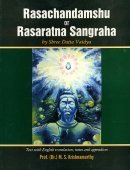Alu, Ālu: 22 definitions
Introduction:
Alu means something in Hinduism, Sanskrit, Jainism, Prakrit, Buddhism, Pali, the history of ancient India, Marathi, Hindi, biology, Tamil. If you want to know the exact meaning, history, etymology or English translation of this term then check out the descriptions on this page. Add your comment or reference to a book if you want to contribute to this summary article.
Alternative spellings of this word include Aalu.
Images (photo gallery)
In Hinduism
Vyakarana (Sanskrit grammar)
Source: Wikisource: A dictionary of Sanskrit grammarĀlu (आलु).—tad. affix in the sense 'तन्न (tanna) xxयते (yate)' e.g. शीतालुः, उष्णालुः (śītāluḥ, uṣṇāluḥ) P.V.2.122.

Vyakarana (व्याकरण, vyākaraṇa) refers to Sanskrit grammar and represents one of the six additional sciences (vedanga) to be studied along with the Vedas. Vyakarana concerns itself with the rules of Sanskrit grammar and linguistic analysis in order to establish the correct context of words and sentences.
In Jainism
General definition (in Jainism)
Source: archive.org: Jaina YogaĀlu (आलु) in Prakrit or Āluka in Sanskrit refers to taro (Arum colocasia). Today this word tends to be given the meaning of ‘potato’. This plant is classifed as ananta-kāya, or “plants that are inhabited by an infinite number of living organisms”, and therefore are abhakṣya (forbidden to consume) according to both Nemicandra (in his Pravacana-sāroddhāra v245-246) and Hemacandra (in his Yogaśāstra 3.44-46). Those plants which are classified as ananta-kāyas (e.g., ālu) seem to be chosen because of certain morphological peculiarities such as the possession of bulbs or rhizomes orthe habit of periodically shedding their leaves; and in general theyare characterized by possibilities of vegetative reproduction.

Jainism is an Indian religion of Dharma whose doctrine revolves around harmlessness (ahimsa) towards every living being. The two major branches (Digambara and Svetambara) of Jainism stimulate self-control (or, shramana, ‘self-reliance’) and spiritual development through a path of peace for the soul to progess to the ultimate goal.
India history and geography
Source: Cologne Digital Sanskrit Dictionaries: Indian Epigraphical GlossaryAḻu.—(SITI), Tamil; a variety of market dues; probably, the same as aḻḻu and aḻḻāya-mānyam. Note: aḻu is defined in the “Indian epigraphical glossary” as it can be found on ancient inscriptions commonly written in Sanskrit, Prakrit or Dravidian languages.

The history of India traces the identification of countries, villages, towns and other regions of India, as well as mythology, zoology, royal dynasties, rulers, tribes, local festivities and traditions and regional languages. Ancient India enjoyed religious freedom and encourages the path of Dharma, a concept common to Buddhism, Hinduism, and Jainism.
Biology (plants and animals)
Source: Wisdom Library: Local Names of Plants and DrugsAlu [अळू] in the Marathi language is the name of a plant identified with Meyna laxiflora from the Rubiaceae (Coffee) family having the following synonyms: Vangueria spinosa. For the possible medicinal usage of alu, you can check this page for potential sources and references, although be aware that any some or none of the side-effects may not be mentioned here, wether they be harmful or beneficial to health.
Alu [आलू] in the Hindi language is the name of a plant identified with Solanum tuberosum Solanum tuberosum L. from the Solanaceae (potato) family.
Alu [ꯑꯂꯨ] in the Manipuri language, ibid. previous identification.
Alu [ಆಲೂ, ಆಲು] in the Kannada language, ibid. previous identification.
Alu [आळू] in the Marathi language is the name of a plant identified with Colocasia esculenta (L.) Schott from the Araceae (Arum) family having the following synonyms: Alocasia illustris, Alocasia dussii.
Alu in the Sanskrit language is the name of a plant identified with Dinebra retroflexa (Vahl) Panz. from the Poaceae (Grass) family having the following synonyms: Cynosurus retroflexus, Dinebra paspaloides.
Source: Google Books: CRC World Dictionary (Regional names)1) Alu in India is the name of a plant defined with Acacia catechu in various botanical sources. This page contains potential references in Ayurveda, modern medicine, and other folk traditions or local practices It has the synonym Acacia catechuoides Benth. (among others).
2) Alu is also identified with Alocasia cucullata It has the synonym Caladium colocasia Schott ex Wight (etc.).
3) Alu is also identified with Alocasia macrorrhizos It has the synonym Arum macrorrhizum L. (etc.).
4) Alu is also identified with Amorphophallus paeoniifolius It has the synonym Arum rumphii Oken (etc.).
5) Alu is also identified with Colocasia esculenta It has the synonym Caladium colocasioides (Desf.) Brongn. (etc.).
6) Alu is also identified with Helianthus tuberosus It has the synonym Helianthus esculentus Warsz. (etc.).
7) Alu is also identified with Meyna laxiflora It has the synonym Vangueria spinosa Roxb..
8) Alu is also identified with Meyna spinosa It has the synonym Vangueria mollis Wall., nom. nud. (etc.).
9) Alu is also identified with Paspalum scrobiculatum It has the synonym Paspalum virgatum Walter, nom. illeg., non Paspalum virgatum L. (etc.).
10) Alu is also identified with Solanum tuberosum It has the synonym Solanum andigenum subsp. ecuatorianum Lechn. (etc.).
Example references for further research on medicinal uses or toxicity (see latin names for full list):
· Fl. Indo-Chine (1924)
· Flora of the British India (1880)
· Flora of Tropical Africa (1920)
· Bulletin of Miscellaneous Information Kew (1928)
· Kew Bulletin (1985)
· Gardener’s chronicle (1885)
If you are looking for specific details regarding Alu, for example pregnancy safety, side effects, health benefits, diet and recipes, chemical composition, extract dosage, have a look at these references.

This sections includes definitions from the five kingdoms of living things: Animals, Plants, Fungi, Protists and Monera. It will include both the official binomial nomenclature (scientific names usually in Latin) as well as regional spellings and variants.
Languages of India and abroad
Pali-English dictionary
Source: BuddhaSasana: Concise Pali-English Dictionaryālu : (nt.) edible root or bulb; yam.
Source: Sutta: The Pali Text Society's Pali-English DictionaryĀlu, (nt.) (Sk. ālu & °ka; cognate with Lat. ālum & alium, see Walde Lat. Wtb. under alium) a bulbous plant, Radix Globosa Esculenta or Amorphophallus (Kern), Arum Campanulatum (Hardy) J.IV, 371 = VI, 578; IV, 373. (Page 109)

Pali is the language of the Tipiṭaka, which is the sacred canon of Theravāda Buddhism and contains much of the Buddha’s speech. Closeley related to Sanskrit, both languages are used interchangeably between religions.
Marathi-English dictionary
Source: DDSA: The Molesworth Marathi and English Dictionaryaḷū (अळू).—m A tree and its fruit. Its fruit is sweetish and of the color of snuff. 2 A vegetable. Arum campanulatum. Sykes. Also Calladium esc. In the Konkan the form is aḷūṃ.
--- OR ---
ālu (आलु).—m S An esculent root, Arum campanulatum. Applied also to the yam, potato &c.
--- OR ---
ālū (आलू).—m ālūbōkhāra m ( P) Prunes from Bukhara, Persian prunes.
Source: DDSA: The Aryabhusan school dictionary, Marathi-Englishālu (आलु).—m An esculent root.
--- OR ---
ālū (आलू).—m ālūbōkhāra m Prunes from Bu- khara, Persian prunes.
Marathi is an Indo-European language having over 70 million native speakers people in (predominantly) Maharashtra India. Marathi, like many other Indo-Aryan languages, evolved from early forms of Prakrit, which itself is a subset of Sanskrit, one of the most ancient languages of the world.
Sanskrit dictionary
Source: DDSA: The practical Sanskrit-English dictionaryAlu (अलु).—[al-un] A small water pot.
Derivable forms: aluḥ (अलुः).
--- OR ---
Ālu (आलु).—
1) An owl.
2) An esculent root (not applied to potato &c.).
3) Ebony; black ebony.
-luḥ f. A pitcher, waterjar.
-lu n. A raft, float.
Derivable forms: āluḥ (आलुः).
--- OR ---
Ālū (आलू).—See आलु (ālu).
Source: Cologne Digital Sanskrit Dictionaries: Edgerton Buddhist Hybrid Sanskrit DictionaryĀlu (आलु).—m. (or f.; Sanskrit Lex. nt., and Sanskrit āluka, nt.; Pali ālu, nt. according to [Pali Text Society’s Pali-English Dictionary]; but AMg. ālu, m. according to Rat- nach., Prakrit m. and nt. according to [Paia-sadda-mahaṇṇavo]), a certain edible tuber: Mahāvyutpatti 5730 āluḥ.
Source: Cologne Digital Sanskrit Dictionaries: Shabda-Sagara Sanskrit-English DictionaryAlu (अलु).—f.
(-luḥ) A small water pot. E. ṛ to go, and uc affix, ra becomes la; also ālu.
--- OR ---
Ālu (आलु).—f.
(-luḥ) A pitcheer, a small water jar. mn. (-luḥ-lu) 1. An esculent root, (Arum campanulatum:) in the modern dialects this name is applied to the yam, potatoe, &c. 2. A raft, a float. m.
(-luḥ) An owl. E. ṛ to go, and uṇ affix, āru what goes, (in the earth, water, &c.) the initial is lengthened, and ra is changed to la.
Source: Cologne Digital Sanskrit Dictionaries: Benfey Sanskrit-English DictionaryĀlu (आलु).—n. A vessel, [Hitopadeśa] iii. [distich] 52.
Source: Cologne Digital Sanskrit Dictionaries: Cappeller Sanskrit-English DictionaryĀlu (आलु).—[feminine] a small water-jar; [neuter] raft, float.
--- OR ---
Ālū (आलू).—[feminine] a small water-jar; [neuter] raft, float.
--- OR ---
Ālū (आलू).—tear or pluck off.
Ālū is a Sanskrit compound consisting of the terms ā and lū (लू).
Source: Cologne Digital Sanskrit Dictionaries: Monier-Williams Sanskrit-English Dictionary1) Alu (अलु):—f. (= ālu q.v.) a small water-pot, [cf. Lexicographers, esp. such as amarasiṃha, halāyudha, hemacandra, etc.]
2) Ālu (आलु):—m. (√ṛ [commentator or commentary] on [Uṇādi-sūtra i, 5]), an owl, [cf. Lexicographers, esp. such as amarasiṃha, halāyudha, hemacandra, etc.]
3) ebony, black ebony, [cf. Lexicographers, esp. such as amarasiṃha, halāyudha, hemacandra, etc.]
4) f. (us) a pitcher, a small water-jar, [cf. Lexicographers, esp. such as amarasiṃha, halāyudha, hemacandra, etc.]
5) Ālū (आलू):—[from ālu] a f. (ūs) a pitcher, a small water-jar, [cf. Lexicographers, esp. such as amarasiṃha, halāyudha, hemacandra, etc.]
6) Ālu (आलु):—n. a raft, a float
7) an esculent root, Arum Campanulatum, [cf. Lexicographers, esp. such as amarasiṃha, halāyudha, hemacandra, etc.]
8) (in modern dialects applied to the yam, potato etc.)
9) Ālū (आलू):—[=ā-√lū] b [Parasmaipada] -lunāti, to cut, cut off;
—to pluck off.
Source: Cologne Digital Sanskrit Dictionaries: Yates Sanskrit-English Dictionary1) Alu (अलु):—(luḥ) 2. f. Small water-pot.
2) Ālu (आलु):—(luḥ) 2. f. A pitcher. m. An owl. n. An esculent root, yam; raft.
Source: DDSA: Paia-sadda-mahannavo; a comprehensive Prakrit Hindi dictionary (S)Ālu (आलु) in the Sanskrit language is related to the Prakrit word: Ālu.
[Sanskrit to German]
Sanskrit, also spelled संस्कृतम् (saṃskṛtam), is an ancient language of India commonly seen as the grandmother of the Indo-European language family (even English!). Closely allied with Prakrit and Pali, Sanskrit is more exhaustive in both grammar and terms and has the most extensive collection of literature in the world, greatly surpassing its sister-languages Greek and Latin.
Hindi dictionary
Source: DDSA: A practical Hindi-English dictionaryĀlū (आलू) [Also spelled aalu]:—(nm) potato; ~[dama] see [dama ālū].
...
Prakrit-English dictionary
Source: DDSA: Paia-sadda-mahannavo; a comprehensive Prakrit Hindi dictionaryĀlu (आलु) in the Prakrit language is related to the Sanskrit word: Ālu.
Prakrit is an ancient language closely associated with both Pali and Sanskrit. Jain literature is often composed in this language or sub-dialects, such as the Agamas and their commentaries which are written in Ardhamagadhi and Maharashtri Prakrit. The earliest extant texts can be dated to as early as the 4th century BCE although core portions might be older.
Kannada-English dictionary
Source: Alar: Kannada-English corpusAḷu (ಅಳು):—
1) [verb] to shed tears; to weep with or without vocal sound or utterance.
2) [verb] ಅಳದಿದ್ದರೆ ಅಮ್ಮನೂ ಹಾಲುಣಿಸಳು [aladiddare ammanu halunisalu] aḷadiddare ammanū hāluṇisaḷu (prov.) even to get what one deserves, one has to make hue and cry; ಅಳುವ ಮಕ್ಕಳ ಕೈಗೆ ಬೆಲ್ಲ ಕೊಡು [aluva makkala kaige bella kodu] aḷuva makkaḷa kaige bella koḍu (prov.) (to avoid a person making a hue and cry about bigger current demand) pacify with a small gift; ಅಳುವ ಮಕ್ಕಳ ಕಣ್ಣು ಒರಸು [aluva makkala kannu orasu] aḷuva makkaḷa kaṇṇu oresu (prov.) to show hypocritical sympathy; to pretend to be sympathetic.
--- OR ---
Aḷu (ಅಳು):—
1) [noun] a fit of weeping, shedding tears.
2) [noun] a loud vocal sound expressing pain; a cry.
--- OR ---
Aḷu (ಅಳು):—[noun] a kind of tax levied, not in practice now.
--- OR ---
Ālu (ಆಲು):—[verb] to shout aloud.
--- OR ---
Ālu (ಆಲು):—[noun] a small vessel; a small water pot.
--- OR ---
Ālu (ಆಲು):—
1) [noun] the plant Solanum tuberosum of Solanaceae family; potato plant.
2) [noun] its starchy, brown-skinned tuber used as a vegetable; potato.
--- OR ---
Āḷu (ಆಳು):—
1) [verb] to exercise authority over; to rule; to administer; to direct; to control; to manage, to govern.
2) [verb] to obtain; to get; to have; to posses.
3) [verb] to enjoy; to use with delight and satisfaction.
4) [verb] to protect; to faster; to take care of.
--- OR ---
Āḷu (ಆಳು):—
1) [verb] to go under the surface of a liquid; to plunge or sink oneself in to water etc.
2) [verb] to be engaged or absorbed (as in a work, sorrow, etc.) 3) to be or go within.
3) [verb] to cause to drown.
4) [verb] to fall losing one’s strength; to collapse.
--- OR ---
Āḷu (ಆಳು):—
1) [noun] a human being; a woman or a man.
2) [noun] (gen.) a man.
3) [noun] a man of capacity; a capable man; a manly person.
4) [noun] a soldier.
5) [noun] a member of that branch of an army consisting of soldiers trained and equipped to fight chiefly on foot; a foot-soldier.
6) [noun] a disciple.
7) [noun] a person employed to perform services, esp. household duties, for another; a servant.
8) [noun] a chess piece of the lowest value which can be moved only forward and one square at a time (or two squares on its first move), and which captures with a diagonal move; a pawn.
9) [noun] a measure of depth or height, varying from five feet to six feet.
10) [noun] ಆಳು ನೋಡಿದರೆ ಆಕಾರ, ಬಾಳು ನೋಡಿದರೆ ಬಾಯಿಬಡಿದುಕೋ ಬೇಕು [alu nodidare akara, balu nodidare bayibadiduko beku] āḷu nōḍidre ākāra, bāḷu nōḍidare bāyi baḍidukō bēku (said of a person) outwardly impressive, while inwardly useless; the appearance veils the essence; fat hens lay few eggs; ಆಳಾಗಬಲ್ಲವ ಅರಸಾಗಬಲ್ಲ [alagaballava arasagaballa] āḷāga ballava arasāgaballa he who can work hard himself, may manage to get the work done too; he who cannot be a servant of many, will never be a master; ಆಳುಮಾಡಿದ್ದು ಹಾಳು, ತಾನು ಮಾಡಿದ್ದು ಉತ್ತಮ [alumadiddu halu, tanu madiddu uttama] āḷu māḍiddu hāḷu, tānu māḍiddu uttama self-done is well done; depending on others for one’s work to be done, is dangerous; ಆಳುದ್ದ ಭಾವಿಗೆ ಗೇಣುದ್ದ ಹಗ್ಗ [aludda bhavige genudda hagga] āḷudda bhāvige gēṇudda hagga to work with insufficient means; to put a shark in a swimming pool.
Kannada is a Dravidian language (as opposed to the Indo-European language family) mainly spoken in the southwestern region of India.
See also (Relevant definitions)
Starts with (+209): Al-utaiyaaracu, Al-utaiyatevar, Alu-bukhara, Alu-khanu, Alu-pila, Alu-sundi, Alu-tachnu, Aluala, Alubakhada, Alubdha, Alubdhatva, Alubene, Alubh, Alubhashe, Alubhyant, Alubhyat, Alubosa, Alubosa elewe, Alubosa gambari, Alubosa keta.
Ends with (+2192): Aachalu, Aadalu haralu, Aadithyalu, Aalu, Aaralu, Abalu, Abalujabalu, Abbalu, Abhidhyalu, Abhijjhalu, Abilavalu, Acalu, Accahalu, Accalu, Accesalu, Achalu, Acutengitalu, Ada-alu, Adagalu, Adakalu.
Full-text (+177): Phataki, Khandakalu, Tubari, Sphati, Turati, Sphatikari, Andalu, Aalu, Ushnalu, Shankhalu, Svaralu, Raktalu, Taluma-alu-phalnu, Madhvalu, Rangadridha, Suramrittika, Saurashtri, Luncaka, Alavina, Alava.
Relevant text
Search found 27 books and stories containing Alu, Ālū, Alū, Aḷū, Ālu, Aḻu, A-lu, Ā-lū, Aḷu, Āḷu; (plurals include: Alus, Ālūs, Alūs, Aḷūs, Ālus, Aḻus, lus, lūs, Aḷus, Āḷus). You can also click to the full overview containing English textual excerpts. Below are direct links for the most relevant articles:
Chaitanya Bhagavata (by Bhumipati Dāsa)
Verse 3.4.466 < [Chapter 4 - Descriptions of Śrī Acyutānanda’s Pastimes and the Worship of Śrī Mādhavendra]
Tiruvaymoli (Thiruvaimozhi): English translation (by S. Satyamurthi Ayyangar)
Pasuram 6.2.11 < [Section 2 - Second Tiruvaymoli (Min itai matavarkal)]
Pasuram 4.4.4 < [Section 4 - Fourth Tiruvaymoli (Mannai iruntu tulavi)]
Pasuram 10.3.1 < [Section 3 - Third Tiruvaymoli (Vey maru tol inai)]
Rasa Jala Nidhi, vol 2: Minerals (uparasa) (by Bhudeb Mookerjee)
Part 3 - Properties of sphatika (alum) < [Chapter XI - Uparasa (12): Kankshi (clay containing alum)]
Chapter XI - Uparasa (12): Kankshi (clay containing alum)
Part 1 - Characteristics of Kankshi/Tubari (clay containing alum) < [Chapter XI - Uparasa (12): Kankshi (clay containing alum)]
Folk Tales of Gujarat (and Jhaverchand Meghani) (by Vandana P. Soni)
Chapter 37 - Bapu Bhalalo < [Part 5 - Rang Chee Barot]
Atharvaveda and Charaka Samhita (by Laxmi Maji)
Treatment of Eye diseases < [Chapter 3 - Diseases and Remedial measures (described in Atharvaveda)]
Arśa (piles) according to Caraka < [Chapter 4 - Diseases and Remedial measures (described in Caraka-saṃhitā)]
Indian Medicinal Plants (by Kanhoba Ranchoddas Kirtikar)
50. Berberis lycium, Royle. < [Berberidaceae (barberry family)]
Notes on rasanjana (aqueous extract of Berberis aristata) < [Notes]
Related products






